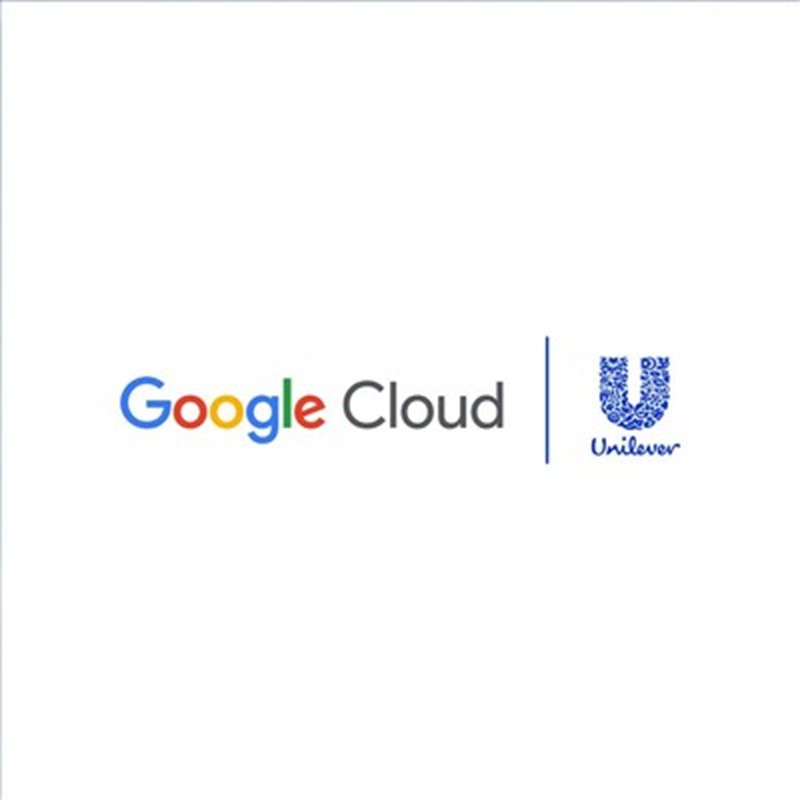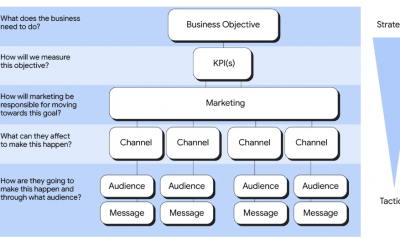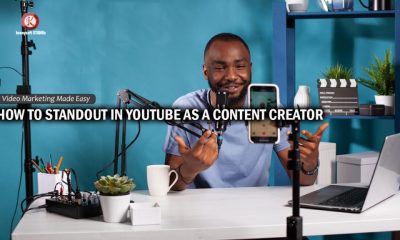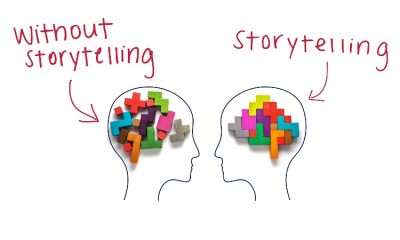Brands/Products
How Effective is Storytelling in Marketing?

By Kenneth Horsfall
To begin with, what is storytelling generally? According to wikipedia.org, storytelling is the social and cultural activity of sharing stories, sometimes with improvisation, theatrics or embellishment.
Every culture has its own stories or narratives, which are shared as a means of entertainment, education, cultural preservation or instilling moral values.
Crucial elements of stories and storytelling include plot, characters and narrative point of view. The term “storytelling” can refer specifically to oral storytelling but also broadly to techniques used in other media to unfold or disclose the narrative of a story.
Storytelling is one of the oldest yet most powerful communication tools we have as humans. Stories help us to share, engage and comprehend in ways few other mechanisms can.
In marketing, storytelling provides an avenue to connect to consumers unlike any other. Brands are empowered to share and sell their values and personality in a form that feels less like advertising and more like a concerted effort to strengthen customer relationships.
Storytelling’s importance to marketing is undeniable; Jennifer Aaker, a professor at Stanford’s Graduate School of Business, puts forward three core reasons as to why:
- Stories Shape How People See You
- Stories Are Tools Of Power
- Stories Persuade And Move People To Action
- Stories shape how people see you:
Brand narratives help form perceptions and attitudes. How people speak about and the way a brand presents itself all influence key metrics such as purchase consideration and brand loyalty. There is power in crafting stories to develop a desired identity and authenticity that hopefully resonates with consumers.
Try thinking about a brand you particularly like. Now imagine they were a person. How would you describe them to friends?
- Stories are tools of power:
One of the best things about a great story is the ability to engross and capture an audience completely. Think about the last book you read that you just couldn’t put down or a party you’ve been to where someone shared an anecdote that had people hooked on every word. Often is the case, you’re completely absorbed in what your reading/hearing and time feel like it slows down around you.
In the world of marketing, communicating a great story has the potential to cut through much of the monotony of today’s advertising by presenting something that is unique and captivating, making consumers stop and listen.
- Stories persuade and move people to action:
Stories are far more impactful in promoting retention and behaviour than functional messaging. A London School of Business study found that when people hear statistics alone, “they retain only 5% to 10%” of what they’ve heard. Yet, “when stories are used to convey the same information, retention jumps to a remarkable 65 to 75%.”
Now, understanding the importance of storytelling, what makes an engaging story? How do marketers create a desired feeling and experience for their consumers to help drive brand connection?
Matthew Luhn, story consultant and animator known for his work in Pixar movies such as Toy Story, Ratatouille and Inside Out, shares five core elements he believes all great stories should possess:
- Hook
- Character transformation
- Connection with the audience
- Authenticity
- Structure
- Hook:
The hook relates to the story’s core theme. In essence, what will draw people in and make them compelled to see what is about to unfold? Luhn explains it usually needs to be something unusual or unexpected to grab the audience’s attention immediately.
- Character transformation:
Once you have captured the attention of the audience, it is important to take them on a journey. Stories inspire transformation. People tend to live vicariously through characters. It is, therefore, essential to question; what is the message we are hoping to convey, and how will this advertisement effect a change in the consumer?
- Connection with the audience:
A story may be expertly crafted in hook and transformation, but if you don’t truly understand the audience you are trying to appeal to, it is likely to become lost or ignored. It’s not simply a case of knowing demographics either; a strong comprehension of things like audience values and motivators is critical for connection. Luhn uses the example of Ratatouille:
- Authenticity
Authenticity is perhaps one of the most difficult aspects of storytelling in marketing, Consumers are often wary that they are being advertised to. It is, therefore, important to communicate something that comes from a piece of truth based on enduring insight rather than something that feels manufactured.
- Structure
Finally, how the story is told is critical for its success. Simply put, structures that comprise a set-up, conflict and pay-off are believed to be most effective in storytelling.
Storytelling is a powerful method of learning. As marketers, we should always seek to learn more about the world we live in, the brands we represent, and the consumers we serve. One of the things that are unique about stories is that they transmit knowledge and meaning. We learn from observations and first-hand experiences and by sharing those experiences through stories.
Storytelling can be a powerful tool that enables marketers to understand what is going on in the marketplace and what that means for the customer, consumer, society, brand, and company.
In addition to being an important strategic tool, storytelling can be an important tactical tool that lets marketers engage consumers in a fragmented media world. Because there is such media fragmentation, consumers are not just looking for different experiences but different delivery. Why should a consumer give you their time? Storytelling isn’t just a creative approach to marketing. It gives your consumers a totally different entry to your brand.
Kenneth Horsfall is the creative director and founder of K.S. Kennysoft Studios Production Ltd, fondly called Kennysoft STUDIOs. Kennysoft STUDIOs is a Nigerian Video and Animation Production Studio. He is also the founder and lead instructor at Kennysoft Film Academy. He can be reached via di******@*************io.com
Brands/Products
Lafarge Africa Rewards Customers, Transporters With Luxury SUVs, Others

By Modupe Gbadeyanka
Customers, transporters, and key stakeholders of Lafarge Africa Plc gathered in Lagos on Saturday, February 21, 2026, for the company’s 2025 Customer & Transporter Awards.
The event was put together to recognise the invaluable contributions of customers and transporters who ensure the company’s products reach every part of the country. The 2025 edition celebrated partners whose dedication, integrity, and resilience have strengthened the company’s market leadership despite evolving economic realities.
The chief executive of Lafarge Africa, Mr Lolu Alade-Akinyemi, thanked the trade partners for their loyalty and commitment to the business.
He noted that Lafarge Africa’s growth story would be incomplete without its partners’ market insights, trust, and consistent support. He emphasised that the company would continue to push boundaries in quality, innovation, and high performance, inspired by the strength of its partnerships.
“We are here to honour partnership. We want to thank our customers for partnering with us in 2025. In 2025, we expanded our retail presence and focused on customer experience.
“We strengthened our ready-mix business, launched new products, including Ecoplanet Elephant and Ecocrete, our low-carbon cement and concrete solutions, and walked the talk on innovation, using technology as a competitive advantage. We could not have done this without our customers and partners,” he said.
Also speaking, the Commercial Director of Lafarge Africa, Mr Gbenga Onimowo, described customers and transporters as “trade champions” whose excellence and unwavering belief in the company’s products have sustained the company’s strong position in the market.
“You are a vital part of our business, ensuring our products are visible and accessible across the country. Your contribution merits daily appreciation. Tonight’s expression of thanks is special because it gives us the opportunity to celebrate our wins together, in person.
“While we celebrate tonight’s winners, we acknowledge that every partner here has contributed meaningfully to our success. We believe this recognition will inspire even greater achievements in the year ahead,” he added.
On his part, the Logistics Director for Lafarge Africa, Mr Osaze Aghatise, acknowledged the transporters as the critical bridge between the company and its customers, ensuring efficient distribution and nationwide availability of its innovative building solutions. According to him, the awards serve as both recognition and motivation, encouraging partners to continue raising the bar.
Elder Ubong Bassey Obot of Ubotex Nigeria Limited emerged the National Volume Champion. Igwe Cosmas Ezeumeh Chizoba of C.C. Umeh and Sons Limited and Chief Etim Effiong Okon of Batoframoje Enterprises secured the titles of first and second runners-up, respectively. As the champion, Ubong Obot received a 2026 Toyota Land Cruiser. C.C. Umeh and Sons Limited and Batoframoje Enterprises were awarded a 2026 Toyota Prado and a 2026 Toyota Fortuner, respectively.
Additionally, B.I.G MultiQuest Nigeria Limited was recognised as the National Winner- Best Transporter category and was awarded a 2026 Toyota Hilux. Two customers who emerged as National Growth Champions received 15-kVA generating sets, while 4 regional champions were rewarded with a Toyota RAV 4 each. Other winners received prizes including a Changan CS55, GAC S3, Hyundai Creta cars, 13KVA solar inverters, 80-inch Hisense TVs, and deep freezers, among others.
Brands/Products
Police Bust Factories Destroying Beverage Bottles, Crates in Anambra

By Aduragbemi Omiyale
Some factories used for the destruction of returnable packaging materials, including glass bottles and plastic crates belonging to various beverage manufacturing companies, have been busted by officials of the Nigeria Police Force (NPF) in Anambra State.
The security operatives stormed these sites on Thursday in collaboration with the Beer Sectoral Group (BSG) of the Manufacturers Association of Nigeria (NPF).
The Executive Secretary of BSG, Ms Abiola Laseinde, described the act as criminal and a serious economic sabotage, noting that these assets remain the property of beverage companies that have invested heavily in these sustainable packaging materials to protect the environment.
She warned those involved in the act to desist, as offenders will be held liable and made to face the wrath of the law, as the organisation will continue to work with the police to crack down on illegal disposal, theft, and unauthorised recycling of its returnable packaging materials, notably returnable glass bottles and plastic crates.
Ms Laseinde noted that the owners of these factories were involved in destroying returnable packaging materials for reuse, thereby causing the businesses to lose millions of naira in investments.
She added that the group had engaged relevant security and regulatory authorities through formal petitions and intelligence-sharing, seeking lawful intervention to curb the illegal practices, recover company assets, and dismantle unauthorised recycling operations.
According to her, the group identified multiple locations in the South-East where they crush our bottles and crates for resale as raw materials, stressing that investigations had revealed that significant quantities were being diverted from legitimate channels into informal recycling networks.
The BSG scribe also disclosed that, in several instances, bottles were deliberately broken and crates were intentionally shredded for sale as raw materials, undermining the beverage companies’ circular packaging model.
“The recent raid is the outcome of sustained engagements and intelligence-led investigations, and represents a decisive step by authorities to protect legitimate business operations, uphold environmental standards, and deter further illegal activity,” she said.
Ms Laseinde pointed out that, beyond the asset loss, the activities of these individuals pose significant risks to businesses, including supply chain disruptions, increased operational costs, environmental risks arising from unsafe recycling practices and threats to public safety.
“These Returnable Packaging Materials (RPMs) are company-owned assets designed for multiple reuse cycles and form a critical part of their sustainability, cost-efficiency, and product quality systems. It’s a criminal activity to destroy them,” she stated, urging the public to remain vigilant and report any suspicious activity of this nature to the police or call the consumer care lines of the beverage companies.
Brands/Products
Unilever Partners Google Cloud to Sustain Long-term Competitive Edge

By Aduragbemi Omiyale
One of the leading global brands, Unilever, has sealed a five-year deal with Google Cloud for the deployment of technology, especially Artificial Intelligence (AI) to drive growth and desirability for its brand portfolios like Dove, Vaseline and Hellmann’s.
Business Post reports that the collaboration will focus on three core pillars of agentic commerce and marketing intelligence, an integrated data and cloud foundation, and advanced AI.
According to a statement, both parties will collaborate to build next-generation marketing capabilities across brand discovery, conversion and measurement to ensure that Unilever remains at the forefront of shifts in technology and consumer habits.
In addition, Unilever will transition key enterprise applications and data platforms to Google Cloud, creating a connected environment for scalable AI deployment across the value chain.
Also, this partnership will fast-track Unilever’s adoption of pioneering technologies, combining Unilever’s deep expertise with Google’s AI capabilities to sustain Unilever’s long-term competitive edge within the CPG market.
The Chief Supply Chain and Operations Officer at Unilever, Willem Uijen, said, “Technology has moved to the core of value creation at Unilever. As brands are increasingly discovered and chosen in environments shaped by AI, we must lead this shift.
“This collaboration with Google Cloud sets a new level in how technology can power commerce and growth in the fast-moving consumer goods industry, ensuring Unilever is agile, fit for the future, and equipped to unlock value at every level of the company.”
Also commenting, the EMEA president for Google Cloud, Tara Brady, said, “In partnering with Unilever as it boldly reimagines its business processes, we are not just modernizing legacy systems; we are deploying our advanced models, such as Gemini, to create a system of intelligence that reasons, learns, and acts. This will set a new standard for agility and consumer engagement in the CPG sector.”
It was gathered that Unilever would use Google Cloud’s technologies, such as its enterprise AI platform, Vertex AI, to build new capabilities in brand discovery, measurement and AI-augmented marketing. This will create a new model for how consumer packaged goods (CPG) brands are discovered and shopped, as consumer journeys shift toward more conversational and agentic experiences.
By migrating its integrated data and cloud platform to Google Cloud, Unilever will build an enterprise-wide, AI-first digital backbone to generate demand faster, turn data into actionable insights, and respond to market shifts with greater agility. This foundation will also support the development of agentic workflows—intelligent systems capable of executing complex tasks across Unilever’s business processes.
-

 Feature/OPED6 years ago
Feature/OPED6 years agoDavos was Different this year
-
Travel/Tourism10 years ago
Lagos Seals Western Lodge Hotel In Ikorodu
-

 Showbiz3 years ago
Showbiz3 years agoEstranged Lover Releases Videos of Empress Njamah Bathing
-

 Banking8 years ago
Banking8 years agoSort Codes of GTBank Branches in Nigeria
-

 Economy3 years ago
Economy3 years agoSubsidy Removal: CNG at N130 Per Litre Cheaper Than Petrol—IPMAN
-

 Banking3 years ago
Banking3 years agoSort Codes of UBA Branches in Nigeria
-

 Banking3 years ago
Banking3 years agoFirst Bank Announces Planned Downtime
-

 Sports3 years ago
Sports3 years agoHighest Paid Nigerian Footballer – How Much Do Nigerian Footballers Earn























